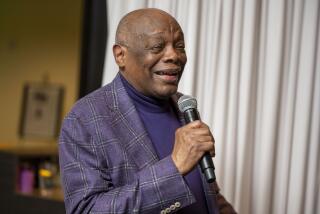Willie Brown Denies Connection With Silberman
- Share via
SACRAMENTO — Assembly Speaker Willie Brown on Saturday emphatically denied allegations that he may have funneled into his law practice money from businesses with an interest in bills considered by the Legislature.
Brown, a San Francisco Democrat, said the charges, attributed by the FBI to convicted San Diego businessman Richard T. Silberman, are “totally and completely unsupported.”
“It’s an irresponsible allegation made by a sick man who’s been convicted,” Brown told The Times in an interview on the Assembly floor.
Silberman’s comments were reflected in notes taken by an FBI agent in April, 1989, when Silberman was arrested on charges of laundering money characterized by an undercover agent as drug-trafficking profits. Silberman, once the top aide to former Gov. Edmund G. Brown Jr., was convicted June 28 of violating federal currency law and awaits sentencing.
At the time of his arrest, according to the FBI, Silberman sought leniency by offering to set up Brown and others he said he had helped establish foreign corporations to launder money.
Notes of the meeting, taken by FBI agent Charles Walker, indicate that Silberman described Chula Vista City Councilman David Malcolm as Brown’s “bagman” and that Brown’s San Francisco law office had a connection to legislation involving the state unitary tax law and the proposed merger of Southern California Edison Corp. and San Diego Gas & Electric Co.
Part of the notes read:
“7/83--Jap. meeting re unitary tax”
“25K ‘legal fee’--millions in savings”
After leaving former Gov. Brown’s staff, Silberman lobbied the Legislature on behalf of Japanese business interests seeking to overhaul the state’s unitary tax law, which involves the way the state assesses multinational corporations that do business in California.
In 1986, the Legislature revised the system in a way more favorable to foreign corporations.
Brown, speaking after the Assembly completed a rare Saturday session deliberating on the state budget, said he had “no connection at all” to any of the businesses Silberman represented.
“I’d really like to have him go through my client list and tell me which one of those non-Japanese were involved in the unitary matter,” Brown said. “I represent developers and movie stars and record executives and that’s it. I don’t have any other clients.”
Brown also said his law firm has never been connected to Southern California Edison. And he said he had “no idea” why Silberman would describe Malcolm as his “bagman”--a term used in political circles to describe a person who acts as an intermediary for illicit payments from special interests to elected officials.
Brown has twice appointed Malcolm to the state Coastal Commission, but he said he first did so at the recommendation of local officials and members of the Legislature.
“I rejected Malcolm twice,” Brown said. “I rejected him because he was a Republican. They kept sending him back. (State Sen.) Lucy Killea (D-San Diego) and (Assemblyman) Pete Chacon (D-San Diego) and all the Republicans in this house and Democrats in this house lobbied me to accept the recommendations, and I did and I’m really glad I did.
“David’s turned out to be a first-class guy. I wish I could get him to raise money for me.”
Despite his denials, Brown said he could understand why Silberman, desperate to escape prosecution, would try to finger him.
“I practiced law for a long time, and every time I’ve represented anybody who’s gotten nailed, the first thing they start asking me about is, is there some way we can give them (the police) somebody,” Brown said. “They say we’ll give them somebody who can’t get back at us, and we’ll give them somebody they might believe.
“Why Willie Brown? I have no idea. I have no connection at all.”
More to Read
Get the L.A. Times Politics newsletter
Deeply reported insights into legislation, politics and policy from Sacramento, Washington and beyond. In your inbox twice per week.
You may occasionally receive promotional content from the Los Angeles Times.










